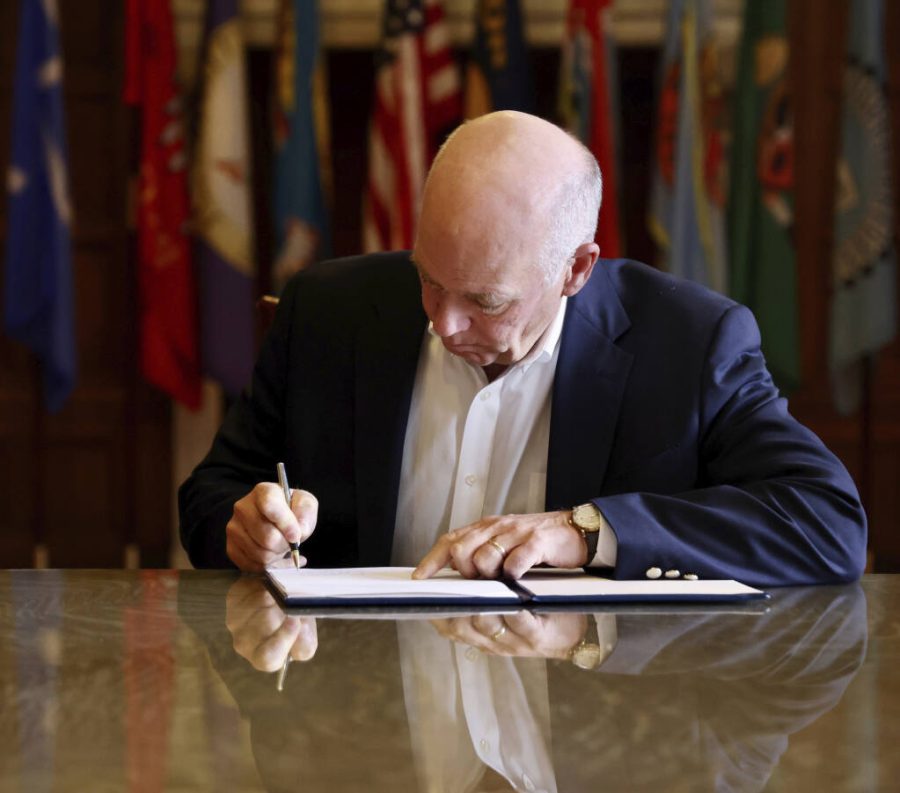UPDATE: Montana’s ban on TikTok presents a domino effect
In this photo provided by the Montana Governor’s Office, Republican Gov. Greg Gianforte signs a law banning TikTok in the state, Wednesday, May 17, 2023, in Helena, Mont. That law made Montana became the first state in the U.S. to completely ban TikTok. (Garrett Turner/Montana Governor’s Office via AP)
May 18, 2023
During the COVID-19 pandemic, teenagers and others from younger generations dove deeper into the world of media for both individualism and networking. Popular apps such as TikTok provided a hub for entertainment and the discovery of new information. Nevertheless, the perception of popular apps took a turn for the worse as U.S. government officials claimed that the Chinese Communist government utilizes TikTok as a way to spy on people and steal personal information. In attempts to protect the American people and America’s government, lawmakers and governors have worked to place limitations on TikTok. On Wednesday, May 17, Montana’s governor Gregory Gianforte made history by banning TikTok from receiving downloads in the app store and by eliminating the company’s operation.
Though this legislation only applies to Montana’s residents thus far, the public has expressed its concerns and hesitance. By banning an app such as TikTok that serves as an app for self-expression, the legislation runs the risk of violating the First Amendmendment guarantee of free speech.
“When I heard about the bill from my parents today, I just felt shocked. I remember there were times [when] everyone on TikTok was like ‘Oh yeah this is our last day on the app’ because they thought TikTok would be banned. So seeing it in action now is wild,” junior Vally Kone said.
Moreover, Gianforte signed the legislation despite Tiktok CEO Shou Chew’s statements in regard to the rumors. In March, Chew testified that the Chinese government has not received personal information about users nor does the app report to the Chinese government. He attempted to reassure the alarmed Republicans that all user information remains safely stored and that the app does not pose harm to national security. Nevertheless, Republicans such as Gianforte felt that the Chinese-owned company threatened U.S. security and safety.
The legislation’s passing in Montana proposes a possible domino effect within the rest of the nation. States such as Georgia have previously taken measures to eliminate the use of TikTok. Georgia Governor Brian Kemp banned the download of TikTok on government-issued phones in mid-December to protect American privacy from the Chinese government. Moreover, in mid-December, the University System of Georgia restricted the use of TikTok on state-issued devices.
“Well, both Montana and Georgia have Republican leaders. So I wouldn’t be surprised really if Georgia did the same. I guess it’s just a wait-and-see type of thing because you can’t know until our governor says something. If he does decide to sign it too, I think a lot of teenagers and other people like that would be mad [be]cause we use the app all the time,” Kone said.
With Georgia’s obvious discomfort with the streaming app, Georgia residents that adore TikTok feel anxious about Gianforte’s passing of the legislation. Though the bill may face charges by possibly violating the First Amendment, Congress may prioritize American privacy and safety if they conclude that the current use of TikTok proves significantly harmful to the American people and national security.







